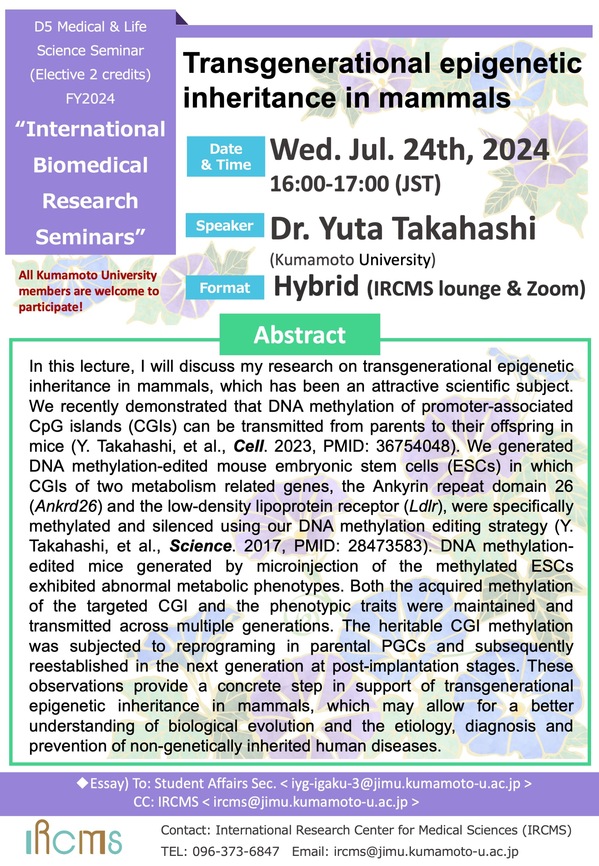- HOME
- News & Events
- [Jul. 24] D5 Seminar- Dr. Yuta Takahashi (IRCMS)
News & Events
[Jul. 24] D5 Seminar- Dr. Yuta Takahashi (IRCMS)
May 24 2024
The "D5 Medical & Life Science Seminar" course will be offered by International Research Center for Medical Sciences (IRCMS). It will run from May 2024 to March 2025, with lectures given by scientists who are affiliated with IRCMS or in collaboration with researchers at IRCMS. The lectures will be given once a month, in English, and by leading scientists in the relevant research field. Students will be taught: 1) how normal physiological functions are maintained in the human body; 2) how these systems become abnormal under certain pathophysiologic conditions; 3) why stem cells are important in animal development and homeostasis; 4) how stem cell-based approaches can help us understand disease mechanisms and find potential cure for diseases related to stem cell malfunction (e.g., cancer, aging).
Anyone who wants to join is welcome.
For students who have registered for the course, please check your attendance in Moodle.
Date : July 24th, 2024 (Wednesday)
Format : Hybrid
Time : 16:00 - 17:00 (JST)
Speaker : Dr. Yuta Takahashi (IRCMS)
Title : Transgenerational epigenetic inheritance in mammals
Abstract :
In this lecture, I will discuss my research on transgenerational epigenetic inheritance in mammals, which has been an attractive scientific subject. We recently demonstrated that DNA methylation of promoter-associated CpG islands (CGIs) can be transmitted from parents to their offspring in mice (Y. Takahashi, et al., Cell. 2023, PMID: 36754048). We generated DNA methylation-edited mouse embryonic stem cells (ESCs) in which CGIs of two metabolism related genes, the Ankyrin repeat domain 26 (Ankrd26) and the low-density lipoprotein receptor (Ldlr), were specifically methylated and silenced using our DNA methylation editing strategy (Y. Takahashi, et al., Science. 2017, PMID: 28473583). DNA methylation-edited mice generated by microinjection of the methylated ESCs exhibited abnormal metabolic phenotypes. Both the acquired methylation of the targeted CGI and the phenotypic traits were maintained and transmitted across multiple generations. The heritable CGI methylation was subjected to reprograming in parental PGCs and subsequently reestablished in the next generation at post-implantation stages. These observations provide a concrete step in support of transgenerational epigenetic inheritance in mammals, which may allow for a better understanding of biological evolution and the etiology, diagnosis and prevention of non-genetically inherited human diseases.
2-3 major papers:
1. Takahashi Y, Morales Valencia M, Yu Y, Ouchi Y, Takahashi K, Shokhirev MN, Lande K, Williams AE, Fresia C, Kurita M, Hishida T, Shojima K, Hatanaka F, Nuñez-Delicado E, Rodriquez Esteban C, Izpisua Belmonte JC. Transgenerational inheritance of acquired epigenetic signatures at CpG islands in mice. Cell. 2023; 186: 4, 715-731, PMID: 36754048, DOI: 10.1016/j.cell.2022.12.047
2. Takahashi Y, Wu J, Suzuki K, Martinez-Redondo P, Li M, Liao HK, Wu MZ, Hernández-Benítez R, Hishida T, Shokhirev MN, Esteban CR, Sancho-Martinez I, Izpisua Belmonte JC. Integration of CpG-free DNA induces de novo methylation of CpG islands in pluripotent stem cells. Science. 2017; 356: 503-508, PMID: 28473583, DOI: 10.1126/science.aag3260
Flyer: (Click to enlarge)

